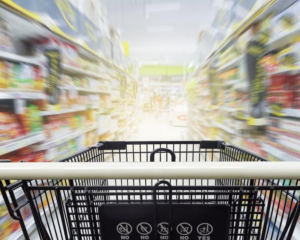Food prices are no longer increasing at the dizzying pace recorded in 2023 - but the recent run of inflation has left shoppers shelling out significantly more for their groceries.
Food price inflation picked up pace from the end of 2022 and peaked mid last year, with increases running into double-digit percentages.
It has dropped significantly in recent months. In June, the first annual food price drop in six years was recorded.
But Infometrics chief executive Brad Olsen calculated that overall food prices were a bit more than 18 percent higher in July this year than they were in July 2021.
Fruit and vegetable prices were 7.3 percent higher, meats, poultry and fish were 16 percent higher, grocery food was 22 percent higher, non-alcoholic drinks 19 percent and restaurant and ready-to-eat meals nearly 21 percent.
Within the categories, there was significant difference. Pork prices were 23 percent higher while mutton and lamb were down 2 percent.
Milk was up 8 percent and yoghurt 33 percent. Oils and fats, such as cooking oils were up 42 percent.
Fonterra said the price people paid for dairy products was influenced by global commodity prices and the cost of making the finished products.
Stats NZ said olive oil had the biggest price change over that period, up 83.6 percent. It was followed by the price for a dozen eggs, up 79.8 percent and kumara, up 72.3 percent.
But the price of some fruit and vegetables fell. Broccoli was down 47.9 percent, lettuce 38.5 percent and cauliflower 29.1 percent.
Olsen said the data showed there were a lot of moving parts that affected food prices.
"Higher cooking oil prices for example were driven by the Russian invasion of Ukraine which limited cooking oil supplies, which haven't fully corrected. Cooking oil prices ...have increased more in the last year or so due to lower production and lower yields."
"Egg prices being higher reflects domestic production changes, with fewer eggs being produced. The lower produce prices for some items is likely reflective of slightly shifting seasonality year-to-year and wider supply and demand changes."
A strong season for broccoli has helped to push its price down.
Olsen said input prices were higher too. The minimum wage has lifted, which may affect restaurant prices, and the cost of electricity, shipping and many on-farm costs had also risen.
He said households were spending more of their money on food. In 2024, they were spending nearly $300 a week on food on average compared to $225 in 2019.
ASB senior economist Mark Smith said most of the price rises were due to supply issues.
Egg prices had peaked in March this year, he said, before falling. Vegetables were affected by weather.
"2023 was not a great year, the weather wasn't resulting in very good output for crops."
He said those climate considerations could cause more price volatility in the future.
"Climactic factors are going to become more frequent, from that component you could expect more variability going forward. It can make things very difficult for growers, they're taking quite a lot of risk putting down crops... all it takes is a cyclone to essentially wipe out a lot of investment that's been put in and a lot of time as well. This is one of the costs of climate change, a lot more variability and uncertainty on the part of growers."
Smith said, since 2020, food prices were up about 25 percent overall.
Tomatoes had peaked at $17.80 a kilogram before falling back to about $11.40 but had hit a trough of $4 a kilogram in February this year.
"There are seasonal elements to all this but it comes down to climate variability."
He said lettuce prices were close to half their peak. Cauliflower had hit $6.40 in September 2022 but had fallen back to about $3.
Broccoli had peaked at about $13.40 but dropped to $6.
"The message for people is to shop in line with seasonal patterns and be flexible in what you're doing."
He said prices would probably pick up a bit next year as meat and dairy prices recovered internationally.
"That's encouraging for the New Zealand exporter, maybe not so encouraging for the New Zealand shopper."











